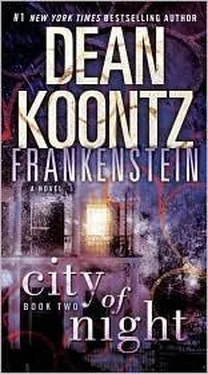“We’ll meet later at your house,” Deucalion told her. “In a little while.”
“ ‘Darkness was upon the face of the deep,’” Laffite said in his thicker voice. “Is that one, or have I remembered nothing?”
“Genesis one, verse two,” Deucalion told him. Then he indicated with a gesture that Carson should leave.
She lowered the pistol and reluctantly departed.
As she stepped into the hall, she heard Laffite say, “He says we’ll live a thousand years. I feel as if I already have.”
In the secret drawing room, Erika considered speaking again to the occupant of the glass case.
Without question, it had moved: a shadowy spasm within its amber shroud of liquid or gas. Either it had responded to her voice or the timing of its movement had been coincidental.
The Old Race had a saying: There are no coincidences.
They were superstitious, however, and irrational.
As she had been taught in the tank, the universe is nothing but a sea of chaos in which random chance collides with happenstance and spins shatters of meaningless coincidence like shrapnel through our lives.
The purpose of the New Race is to impress order on the face of chaos, to harness the awesome destructive power of the universe and make it serve their needs, to bring meaning to a creation that has been meaningless since time immemorial. And the meaning they will impose upon it is the meaning of their maker, the exaltation of his name and face, the fulfillment of his vision and his every desire, their satisfaction achieved solely by the perfect implementation of his will.
That creed, part of her basic programming, rose into her mind word for word, with remembered music by Wagner and images of millions of the New Race marching in cadence. Her brilliant husband could have been a poet if mere poetry had not been unworthy of his genius.
After she had spoken to the occupant of the case, a primal fear had overcome her, seeming to rise from her very blood and bone, and she retreated to the wingback chair, where she still sat, not just pondering her options but analyzing her motivation.
She had been shaken by William’s amputation of his fingers and by his termination. She had been more deeply moved by Christine’s revelation that she, Erika, had been given a richer emotional life — humility, shame, the potential for pity and compassion — than others of the New Race were granted.
Victor, whose genius was unparalleled in all of history, must have good reason for restricting all other of his people to hatred, envy, anger, and emotions that only turned back upon themselves and did not lead to hope. She was his humble creation, of value only to the extent that she could serve him. She did not have the insight, the knowledge, or the necessary breadth of vision to imagine that she had any right to question his design.
She herself hoped for many things. Most important of all, she hoped to become a better wife, better day by day, and to see approval in Victor’s eyes. Although she had so recently arisen from the tank and had not yet lived much, she couldn’t imagine a life without hope.
If she became a better wife, if eventually she no longer earned a beating during sex, if one day he cherished her, she hoped that she might ask him to allow Christine and others to have hope as she did, and that he would grant her request and give her people gentler lives.
“I am Queen Esther to his King Ahasuerus,” she said, comparing herself to the daughter of Mordecai. Esther had persuaded Ahasuerus to spare her people, the Jews, from annihilation at the hands of Haman, a prince of his realm.
Erika did not know the full story, but she had confidence that the literary allusion, one of thousands in her repertoire, was sound and that, per her programming, she had used it properly.
So.
She must strive to become cherished by Victor. To do so, she must serve him always to perfection. To meet that goal, she must know everything about him, not merely the biography that she had received in direct-to-brain data downloading.
Everything necessarily included the occupant of the tank, which evidently had been imprisoned by Victor. Regardless of the profound fear that it had triggered in her, she must return to the case, face this chaos, and impress order upon it.
At the head of the casket — it definitely seemed more like a casket now than like a jewel box — Erika again lowered her face to the glass at the point directly above where she imagined the face of the occupant waited submerged in amber.
As before, but with less lilt in her voice, she said, “Hello, hello, hello in there.”
The dark shape stirred again, and this time the sound waves of her voice appeared to send blue pulses through the case as the rap of her knuckle had done earlier.
Her lips had been six inches above the glass when she spoke. She leaned closer. Three inches.
“I am Queen Esther to his King Ahasuerus,” she said.
The pulses were a more intense blue than before, and the shadowy occupant seemed to rise closer to the underside of the glass, so she could see the suggestion of a face, but no details.
She said again, “I am Queen Esther to his King Ahasuerus.”
Out of the throbbing blue, out of the unseen face, came a voice in answer, somehow unmuffled by the glass: “You are Erika Five, and you are mine.”
After the black tongue of night licked the last purple off the western horizon, the oil lamps were ignited atop the poles in the west pit.
Like phantom dragons, wings and tails of lambent orange light chased across the trash field, and shadows leaped.
Thirteen of the fourteen members of Nick’s crew were with him in the pit, wearing hip-high boots, faces glistening, lined up in eager anticipation along the route that the pair of low, open-bed trucks would take to the place of interment.
Beside him stood Gunny Alecto, her eyes shining with reflected fire. “Saving savant savour sausages sandwiches savages. Savages! Here come the dead savages, Nick. You got your stuff?”
“I got it.”
“You got your stuff? ”
He raised his pail, which was like her pail, like the pail that each of them carried.
The first of the trucks descended the sloped wall of the pit and growled across the desolation, uncountable varieties of garbage crunching and crackling under the tires.
Five sturdy poles, seven feet high, rose from the bed of the truck. To each pole had been lashed one of the dead members of the Old Race, who had been replaced by replicants. Three had been city bureaucrats, and two had been police officers. Two were female; three were male.
The cadavers had been stripped of clothes. Their eyes had been taped open to give the impression that they bore witness to their humiliation.
The mouths of the dead were wedged open with sticks because their tormentors liked to imagine that they were pleading for mercy or at least were screaming.
One of the males had been delivered dismembered and decapitated. The Crosswoods crew had wired the parts together with malicious glee, putting the head on backward, comically repositioning the genitals.
As the truck drew near, the assembled crew began to jeer the dead with enthusiasm, with mocking laughter and catcalls, louder than they were articulate.
Epsilons, lowest of the rigid social order, were allowed to have contempt for no one of their own race, only for the one-heart men and women who claimed to be the children of God yet could not turn off pain and died so easily. With jeers and venomous laughter, these simplest products of the tanks expressed their detestation and thereby claimed their superiority.
Читать дальше












